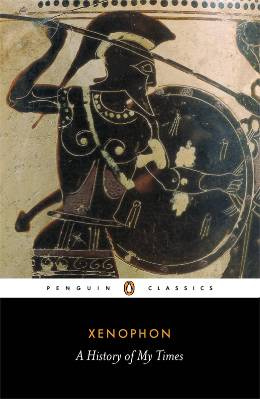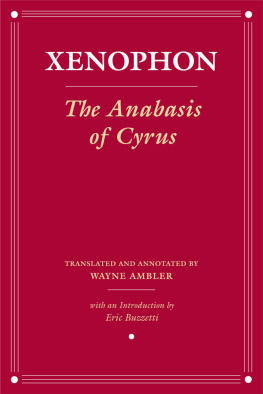Xenophon - On Revenues
Here you can read online Xenophon - On Revenues full text of the book (entire story) in english for free. Download pdf and epub, get meaning, cover and reviews about this ebook. year: 2012, genre: Romance novel. Description of the work, (preface) as well as reviews are available. Best literature library LitArk.com created for fans of good reading and offers a wide selection of genres:
Romance novel
Science fiction
Adventure
Detective
Science
History
Home and family
Prose
Art
Politics
Computer
Non-fiction
Religion
Business
Children
Humor
Choose a favorite category and find really read worthwhile books. Enjoy immersion in the world of imagination, feel the emotions of the characters or learn something new for yourself, make an fascinating discovery.
- Book:On Revenues
- Author:
- Genre:
- Year:2012
- Rating:5 / 5
- Favourites:Add to favourites
- Your mark:
- 100
- 1
- 2
- 3
- 4
- 5
On Revenues: summary, description and annotation
We offer to read an annotation, description, summary or preface (depends on what the author of the book "On Revenues" wrote himself). If you haven't found the necessary information about the book — write in the comments, we will try to find it.
On Revenues — read online for free the complete book (whole text) full work
Below is the text of the book, divided by pages. System saving the place of the last page read, allows you to conveniently read the book "On Revenues" online for free, without having to search again every time where you left off. Put a bookmark, and you can go to the page where you finished reading at any time.
Font size:
Interval:
Bookmark:
Xenophon the Athenian was born 431 B.C. He was a
pupil of Socrates. He marched with the Spartans,
and was exiled from Athens. Sparta gave him land
and property in Scillus, where he lived for many
years before having to move once more, to settle
in Corinth. He died in 354 B.C.
Revenues describes Xenophon's ideas to solve the
problem of poverty in Athens, and thus remove an
excuse to mistreat the Athenian allies.
PREPARER'S NOTE
This was typed from Dakyns' series, "The Works of Xenophon," a
four-volume set. The complete list of Xenophon's works (though
there is doubt about some of these) is:
Work Number of books
The Anabasis 7
The Hellenica 7
The Cyropaedia 8
The Memorabilia 4
The Symposium 1
The Economist 1
On Horsemanship 1
The Sportsman 1
The Cavalry General 1
The Apology 1
On Revenues 1
The Hiero 1
The Agesilaus 1
The Polity of the Athenians and the Lacedaemonians 2
Text in brackets "{}" is my transliteration of Greek text into
English using an Oxford English Dictionary alphabet table. The
diacritical marks have been lost.
For myself I hold to the opinion that the qualities of the leading statesmen in a state, whatever they be, are reproduced in the character of the constitution itself. (1)
(1) "Like minister, like government." For the same idea more fully
expressed, see "Cyrop." VIII. i. 8; viii. 5.
As, however, it has been maintained by certain leading statesmen in Athens that the recognised standard of right and wrong is as high at Athens as elsewhere, but that, owing to the pressure of poverty on the masses, a certain measure of injustice in their dealing with the allied states (2) could not be avoided; I set myself to discover whether by any manner of means it were possible for the citizens of Athens to be supported solely from the soil of Attica itself, which was obviously the most equitable solution. For if so, herein lay, as I believed, the antidote at once to their own poverty and to the feeling of suspicion with which they are regarded by the rest of Hellas.
(2) Lit. "the cities," i.e. of the alliance, {tas summakhidas}.
I had no sooner begun my investigation than one fact presented itself clearly to my mind, which is that the country itself is made by nature to provide the amplest resources. And with a view to establishing the truth of this initial proposition I will describe the physical features of Attica.
In the first place, the extraordinary mildness of the climate is proved by the actual products of the soil. Numerous plants which in many parts of the world appear as stunted leafless growths are here fruit-bearing. And as with the soil so with the sea indenting our coasts, the varied productivity of which is exceptionally great. Again with regard to those kindly fruits of earth (3) which Providence bestows on man season by season, one and all they commence earlier and end later in this land. Nor is the supremacy of Attica shown only in those products which year after year flourish and grow old, but the land contains treasures of a more perennial kind. Within its folds lies imbedded by nature an unstinted store of marble, out of which are chiselled (4) temples and altars of rarest beauty and the glittering splendour of images sacred to the gods. This marble, moreover, is an object of desire to many foreigners, Hellenes and barbarians alike. Then there is land which, although it yields no fruit to the sower, needs only to be quarried in order to feed many times more mouths than it could as corn-land. Doubtless we owe it to a divine dispensation that our land is veined with silver; if we consider how many neighbouring states lie round us by land and sea and yet into none of them does a single thinnest vein of silver penetrate.
(3) Lit. "those good things which the gods afford in their seasons."
(4) Or, "arise," or "are fashioned."
Indeed it would be scarcely irrational to maintain that the city of Athens lies at the navel, not of Hellas merely, but of the habitable world. So true is it, that the farther we remove from Athens the greater the extreme of heat or cold to be encountered; or to use another illustration, the traveller who desires to traverse the confines of Hellas from end to end will find that, whether he voyages by sea or by land, he is describing a circle, the centre of which is Athens. (5)
(5) See "Geog. of Brit. Isles." J. R. and S. A. Green, ch. i. p. 7:
"London, in fact, is placed at what is very nearly the geometrical
centre of those masses of land which make up the earth surface of
the globe, and is thus more than any city of the world the natural
point of convergence for its different lines of navigation," etc.
The natural advantages of Boeotia are similarly set forth by
Ephorus. Cf. Strab. ix. 2, p. 400.
Once more, this land though not literally sea-girt has all the advantages of an island, being accessible to every wind that blows, and can invite to its bosom or waft from its shore all products, since it is peninsular; whilst by land it is the emporium of many markets, as being a portion of the continent.
Lastly, while the majority of states have barbarian neighbours, the source of many troubles, Athens has as her next-door neighbours civilised states which are themselves far remote from the barbarians.
All these advantages, to repeat what I have said, may, I believe, be traced primarily to the soil and position of Attica itself. But these natural blessings may be added to: in the first place, by a careful handling of our resident alien (1) population. And, for my part, I can hardly conceive of a more splendid source of revenue than lies open in this direction. Here you have a self-supporting class of residents conferring large benefits upon the state, and instead of receiving payment (2) themselves, contributing on the contrary to the gain of the exchequer by the sojourners' tax. (3) Nor, under the term careful handling, do I demand more than the removal of obligations which, whilst they confer no benefit on the state, have an air of inflicting various disabilities on the resident aliens. (4) And I would further relieve them from the obligation of serving as hoplites side by side with the citizen proper; since, beside the personal risk, which is great, the trouble of quitting trades and homesteads is no trifle. (5) Incidentally the state itself would benefit by this exemption, if the citizens were more in the habit of campaigning with one another, rather than (6) shoulder to shoulder with Lydians, Phrygians, Syrians, and barbarians from all quarters of the world, who form the staple of our resident alien class. Besides the advantage (of so weeding the ranks), (7) it would add a positive lustre to our city, were it admitted that the men of Athens, her sons, have reliance on themselves rather than on foreigners to fight her battles. And further, supposing we offered our resident aliens a share in various other honourable duties, including the cavalry service, (8) I shall be surprised if we do not increase the goodwill of the aliens themselves, whilst at the same time we add distinctly to the strength and grandeur of our city.
(1) Lit. "metics" or "metoecs."
(2) {misthos}, e.g. of the assembly, the senate, and the dicasts.
(3) The {metoikion}. See Plat. "Laws," 850 B; according to Isaeus, ap.
Harpocr. s.v., it was 12 drachmae per annum for a male and 6
drachmae for a female.
(4) Or, "the class in question." According to Schneider (who cites the
{atimetos metanastes} of Homer, "Il." ix. 648), the reference is
Font size:
Interval:
Bookmark:
Similar books «On Revenues»
Look at similar books to On Revenues. We have selected literature similar in name and meaning in the hope of providing readers with more options to find new, interesting, not yet read works.
Discussion, reviews of the book On Revenues and just readers' own opinions. Leave your comments, write what you think about the work, its meaning or the main characters. Specify what exactly you liked and what you didn't like, and why you think so.















